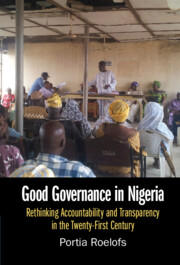Book contents
- Good Governance in Nigeria
- Good Governance in Nigeria
- Copyright page
- Dedication
- Epigraph
- Contents
- Figures
- Tables
- Acknowledgements
- Abbreviations
- Major Characters
- Map of Nigeria
- Additional material
- Introduction
- 1 Contested Legacies of Good Governance
- 2 Good Governance, What’s Not to Love?
- 3 Be Accessible! Accountability, Performance and the Politician Who Is ‘Always in a Meeting’
- 4 Theorising Accountability as Accessibility
- 5 Transparency in People
- 6 Socially Embedded Good Governance
- Conclusion
- Appendix: Methods and Methodology
- Glossary of Yoruba Terms
- Select Bibliography
- Index
Conclusion
What Nigeria Can Teach Us about Good Governance
Published online by Cambridge University Press: 13 April 2023
- Good Governance in Nigeria
- Good Governance in Nigeria
- Copyright page
- Dedication
- Epigraph
- Contents
- Figures
- Tables
- Acknowledgements
- Abbreviations
- Major Characters
- Map of Nigeria
- Additional material
- Introduction
- 1 Contested Legacies of Good Governance
- 2 Good Governance, What’s Not to Love?
- 3 Be Accessible! Accountability, Performance and the Politician Who Is ‘Always in a Meeting’
- 4 Theorising Accountability as Accessibility
- 5 Transparency in People
- 6 Socially Embedded Good Governance
- Conclusion
- Appendix: Methods and Methodology
- Glossary of Yoruba Terms
- Select Bibliography
- Index
Summary
Politics in Nigeria teaches us that power must be socially embedded for it to be accountable. Previous chapters drew on in-depth qualitative fieldwork in southwest Nigeria to theorise alternative conceptions of the constituent parts of the good governance agenda, namely, accountability, transparency, and the public–private divide. If we are to take the social dimension of these “ethnographically derived political concepts” seriously, then we need to rethink the neo-classical economic ontology of the dominant approach to good governance, which relies on principal–agent models. Thus, the book’s empirical analysis gives rise to normative political prescriptions which entail a methodological critique. The second part of the chapter argues that by neglecting the social dimension of governance, technocracy is vulnerable to populist challengers who leverage unmet demands for closeness and connection. Socially embedded governance intersects with three key debates of interest to theorists of democratic politics, concerning scale, inequality and conflict. By rethinking the contours of politics, we discover that the struggles of Nigeria’s fourth republic are not marginal to democratic theory – the struggles of a democracy yet to really get started – rather, they lie at the crux of what it means to wield power responsibly.
Keywords
- Type
- Chapter
- Information
- Good Governance in NigeriaRethinking Accountability and Transparency in the Twenty-First Century, pp. 262 - 291Publisher: Cambridge University PressPrint publication year: 2023

